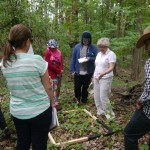
True leaders never stop being minions

The summer has flashed by and keeping to my self-imposed blogging schedule has been tough, even though I stepped down as Director of IRIS, York University's Institute for Research and Innovation in Sustainability, at the end of April 2014, and switched my daily routine from a leader & manager-type schedule, back to that of a common or garden research & teaching professor.
Nearly all York University academic administrators have what are called "teaching buyouts", which gives professors a reduced teaching load. As the director of an Organized Research Unit, I was exempt from teaching two Biology undergraduate half courses each year, although I still taught graduate courses and supervised Biology undergraduate Honours Thesis students (BIOL 4000 course) and graduate students. During this 7-year period, encompassing 4 renewed terms as IRIS Director, I also taught 2 undergraduate half courses, which made an already hectic schedule even nuttier.
I assumed that after this, I'd have loads more free time to finish papers, analyze data and blog, but that hasn't been the case at all. In mid-July, after missing numerous deadlines of all kinds and breaking promises to colleagues and students, that I made in April and May, to get stuff done for them, I stopped and took stock. In doing so, I called upon some of the skills and resources that I acquired while directing IRIS:
- I tracked my hours in detail.
- I re-read two of my favourite management & leadership books.
I discovered and started using a cool app called ATracker PRO. I also listened, again, to my Dave Allen Ready for Anything audiobook. It's got loads of great ideas.
Tracking hours is so basic yet so few people, especially students, seem to do it. I quickly discovered why I hadn't been checking things off my To-Do list. I've been doing crazy long hours of teaching, including the administration side, since early June. This included teaching a half-year field course, packed into 2 weeks at the end of June, guest speaking in an NSERC CREATE workshop and also for a whole day, in the 2014 Sustainable Design Workshop course that I oversaw the development of, back in 2008, and supervising 3 undergraduate students in the lab, as well as several grad. students from outside of Biology, whom I agreed to help supervise as they finish their course work master's degrees. Wow, I need to breathe deeply, after a reading that.
I determined, that between January and December 2014, I will have done the equivalent of the regular teaching load that a Biology prof. normally spreads over two years. OK, good to know: it brings perspective.
On top of all of this, I discovered that I was regularly staying many hours into the weekday evenings during June and July, tidying up my lab office, to make space for re-integrating my paper work from the IRIS office. This was adding another 10-15 hours per week. My office is now a lot cleaner and tidier, and I discovered lots of missing things, including messages from students, that were buried under piles of paper. At least I got to have fun on twitter with the #MessyDesk hashtag and associated blogs.
@dawnbazely To do my #deskshaming justice requires pano mode. Checking into desk rehab real soon now. pic.twitter.com/eCfpVW3BQF
— Jim Woodgett (@jwoodgett) July 17, 2014
— Jim Woodgett (@jwoodgett) July 17, 2014
So, getting things that are expected of you, done (or not), requires knowing how your time is spent. Scientists regularly work 50-60 hours per week, but doing less than that wasn't my issue. I was doing tasks (teaching and organizing) that were running way over the time allotted in my mind.
Another time drain I discovered, was that I continued to deal with colleagues, staff and students from IRIS, anxious about the fall-out from the York University decision not to renew the IRIS Senate charter. The executive was in contact with the University Senate on this topic and the bureaucracy involved in the back and forth was considerable, although the effort ultimately came to nothing.
I have assigned myself a time category: "York University Bureaucracy" and am tracking time to ensure that I don't go over 20% of a 40 hour week (that's 8 hours max on service): York University staff of all kinds NOT directly engaged in research and teaching, be on alert: your face time with me is limited and I am judging your performance on whether you are hindering or helping me in delivering my main two missions. I will be writing about the draining experience of dealing with the York University administration with respect to IRIS going through a futile re-chartering process & search for a new director, which was called off at the end, in future posts. In the mean time, suffice to say that I watched the University of Saskatchewan firing of a dean and a president, very closely, looking for points of similarity between what emerged from that story and my own experience with York University administrators who failed to be transparent and collegial while claiming this to be their preferred modus operandi.
Ultimately, by tracking my time, to understand why I felt like a hamster in a wheel going nowhere, I could then think about why I wasn't delivering on my other university duty of research, as well as I thought I should be. For this, I turned to Marshall Goldsmith's What Got You Here, Won't Get You There.
All professors should read this book, especially those that see administration and being a deanlet as an escape route from doing teaching and research (both of which I actually like a lot). In re-reading Goldsmith, I realized that I'm still leading and developing interdisciplinary research collaborations. They originated in IRIS and have moved into my Biology lab. So, I'm not back to being an individual PI but was behaving like one, while, in fact, still being a team leader: all of the collaboration costs and interaction efforts are ongoing and heavy. I had forgotten this, as I stepped off the research institute director & administrator pathway onto the regular Biology professor track.
Fortunately, during my seven years as director of IRIS, I got to interact with colleagues from all York faculties, including the Schulich Business School, from whom I learned about corporate social responsibility, management, leadership, ethics and organizational behaviour. I also beefed up my skills for leading and participate in teams.
For an A-type personality, and a perpetually late "Producer", as described in Diana DeLonzor's Never Be Late Again, going through this soft-skill exercise, has brought me relief. Once I framed my research and teaching outlook correctly, during July 2014, I found that I started checking the big ticket items off my To-Do list (ie I finally got around to eating some frogs). Brian Tracy's book on procrastination has also helped me a lot over the decades since it was published in 2001.
Dawn Bazely
Updated June 11, 2021 -- all students, staff and faculty should read the second edition of the excellent, free to download, manual from the USA National Cancer Institute, Collaboration and Team Science: A Field Guide. I read the first edition it at its launch at a conference about interdisciplinary research, in 2010.

